- Tags:
- buckwheat noodles / hogushimizu / Japanese convenience stores / Soba / zarusoba
Related Article
-
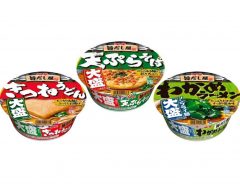
New packaging design lets you slurp instant ramen while watching your health
-
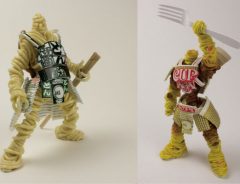
Japanese Designer Crafts Awesome Samurai Noodle Warriors
-
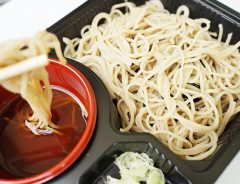
The Oedo Soba And Sake Festival Proves That There’s More To Soba Than You May Think!
-
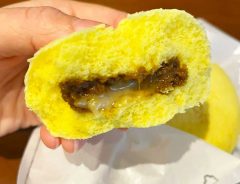
We found these awesome steamed cheese curry buns and now we can’t get enough
-
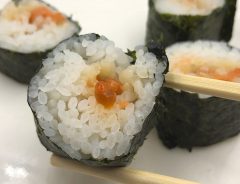
Some of the tasty sushi rolls you’ll find in Japanese convenience stores [Review]
-
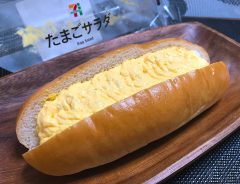
7-Eleven Japan’s delicious egg roll sandwiches deliver the most value for your yen
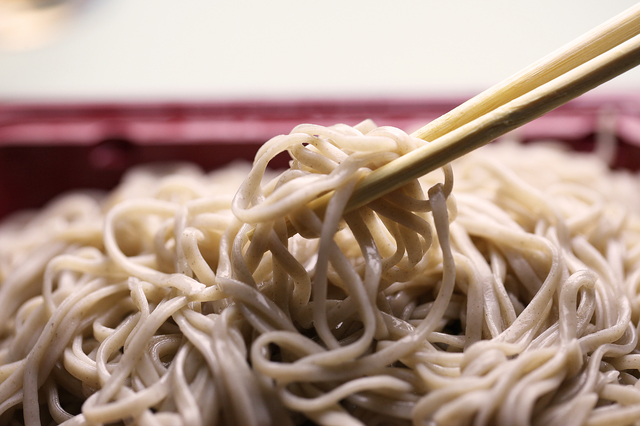


You may have encountered it when you bought a package of zarusoba ざる蕎麦 (cold soba buckwheat noodles) at the convenience store. Trying to look inconspicuous nestled among the other individually wrapped plastic packages such as the cold tsuyu broth, the wasabi, the thinly shredded strips of nori seaweed topping and the chili pepper mix, you might find it there.
Hogushimizu ほぐし水
You'll find a package containing a clear liquid which isn't broth. The instructions will usually advise you to pour the contents evenly onto the noodles to loosen them.
Is is tasty? Maybe I should drink it...
Although the purpose of hogushimizu, which can be literally translated as "loosening water," is clear enough from the name, its presence can bring up a few questions.
Let's get the most obvious one out of the way.
Why do noodles need to be "loosened" in the first place?
Just like pasta, the starch contained in cooked buckwheat noddles makes them stick together when they cool, so "loosening water" can fix that. Fair enough. But the mystery lies in what hogushimizu actually contains.
What is inside "loosening water"?
Many rumors can be found online about it. Some people say it has special properties that dissolve starch, so drinking it by itself can cause upset stomach and even diarrhea. Other people say it's nothing more than plain water and doesn't really need to be there since the tsuyu broth can loosen the noodles anyway.
According to an article in NetLab, zarusoba noodles sold by 7-Eleven have included hogushimizu since 2007, the contents of which are simply water.
However, this is not always the case. For example, Mafujiya Shokuhin Co., Ltd. adds sodium and amino acids to theirs in order not to water down the taste of the broth, and famous food and seasonings manufacturer Ajinomoto even has a trademark on "loosening water containing dashi."
Noodles need some loosening up from time to time
Do you want some hogushimizu sent to you? Even though it's manufactured by various companies in Japan, you won't find hogushimizu sold commercially to the general public, and convenience stores don't ship their refrigerated prepared meals in the mail.
However, there is one way:
As one Twitter user discovered last weekend while looking through the popular selling app Mercari, someone had actually put a package of hogushimizu up for sale.
I've been using Mercari for a bit less than 5 years now, but I've finally found it: hogushimizu (300 JPY)
The seller may have been doing this for laughs, however, since the category is listed as "cosmetics, perfume, beauty, skin care (...)", which prompted the following exchange:
"What? But the category is..."
OP: "From the noodles' point of view...?"
We humans like to loosen up with a massage or a back rub when we're stressed, so maybe noodles enjoy "loosening up" as well...
Other applications?
What if other things could also be loosened up with hogushimizu. The word seems to have inspired quite a bit of wishful thinking.
For example:
This is a lifehack that not too many people know about but the hogushimizu they put in convenience store zarusoba doesn't specify "for noodles" so you can use it to loosen up other things. For example, if you don't get along with your boss, you can pour it on him to loosen up the tension between you.
Hmm... Maybe you should use your noodle before trying that one...